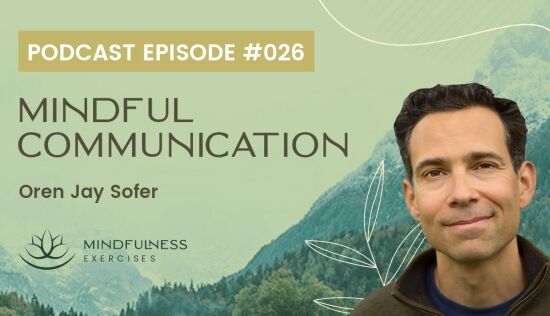Listen now

When communicating with others, how present are you in body, speech and mind? And have you ever found yourself in conversation with someone who was truly and fully present with you?
We all know how to speak and listen, but few do it effectively. Mindful communication helps us have truly meaningful conversations that are full of empathy and understanding. In this episode, Mindfulness Exercises founder Sean Fargo speaks with author and mindful communication expert Oren Jay Sofer on how to become a more skillful communicator.
“Skillful communication is not about what we say. It’s about where we’re coming from inside and the quality of understanding or connection we’re able to create with someone.”
Sponsored by our Mindfulness Meditation Teacher Certification Program
MindfulnessExercises.com/Certify
Show Notes:
What is Mindful Communication?
As human beings, we communicate to get things done and to meet other needs, such as the need for connection. Whether this serves a logistical or relational purpose, the foundation of communication is understanding. If we don’t understand each other, we’re not communicating. Mindful communication enhances our understanding by bringing in awareness.
“Tying your shoes is a basic skill that relies on manual dexterity. Playing the piano is a high order skill. It takes that basic capacity of manual dexterity, refines it to a high degree and adds in a few other very important capacities, like the ability to listen. And then you get this capacity to make music. Mindful communication, skillful communication, is a high order skill. It takes very basic, simple capacities that we all have as human beings - to hear, to form words - and it refines those to another level.”
The conditions that support dialogue
We all know how to speak and listen, but to make our conversations as effective as possible, certain conditions need to be present. Based on research that clarifies exactly what these conditions are, Oren has created a 3-point training that integrates the teachings of non-violent communication and mindfulness. Practicing mindful communication leads to better conversations and more meaningful relationships.
“Mindful communication is a training in three different foundations. The first is about training ourselves in presence, learning to be here. The second is about our intention, where we’re coming from, and the third is about our attention. What are we focusing on? What are we paying attention to and how do we actually craft our words in a way that’s going to convey what’s actually in our heart?”
Training in Presence
Training in presence is similar to training in mindfulness. We learn to be aware of what’s actually happening in a balanced, non-reactive way. Embodying steadiness, curiosity and non-judgment while in conversation allows us not only to be mindful of what someone else is saying, but mindful of our own inner experience. This deep listening can also be quite challenging. It requires training, practice and patience.
“Can we just be here, in our body, with another human being? And the truth, if you practice this, is that that’s vulnerable. [...] Not only that, but it can be challenging. Challenging not to be present for a moment, but to stay present. So leading with presence means we show up and then we keep coming back to that. We keep returning to a place of embodied presence.”
The inner qualities behind our words
In the context of mindful communication, intention does not refer to our intended goal or what we might want to get from our conversations. Rather, it describes the intent behind our words, the qualities we bring to our conversations. When we’re mindful of intent, our words are more likely to align with our body language. And it’s body language that generally speaks loudest.
“What are the qualities, internally, that I’m bringing to the conversation? Intention determines the direction of the conversation. Intention is the single most powerful and transformative ingredient in a dialogue. Why? When you’re in a conversation with somebody, if their words are saying one thing and their facial expression, their tone of voice, their body language is saying something else, which do you trust? [...] You can learn all kinds of fancy communication skills, and if your intention is off, people will feel it.”
Addressing core needs in conversation
Attention, the third component of mindful communication training, is about focusing on what matters and never losing sight of the purpose of the conversation. Every human being only wants to be happy and free from their pain. Understanding this is the doorway to compassion. Compassionately connecting to the core needs of another can help us look past behavior we might disagree with, and instead, identify opportunities to work together and address those needs.
“We can hear and connect with others. I can disagree with you but still find something in your heart that I recognize in my heart. That gives us the capacity to transform our judgments and blame. [...] Finally, when we’re able to identify what matters to us, to someone else, now we have more opportunities to work together, we can be more creative. We can collaborate because we’ve actually gotten down to the root of what’s important here.”
Resources
About Oren Jay Sofer
Oren Jay Sofer is a former Buddhist monk who teaches Insight meditation and mindful communication both in person and online. He is the author of Say What You Mean: A Mindful Approach to Nonviolent Communication, which is a practical guidebook for having more effective, satisfying conversations. Oren’s innovative communication training and courses integrate Marshall Rosenberg’s work on Nonviolent Communication (NVC) with mindfulness practice.
Oren has a degree in Comparative Religion from Columbia University and is a long-time student of Joseph Goldstein, Michele McDonald, and Ajahn Sucitto. He is a graduate of the Spirit Rock Vipassana Teacher Training and a current member of the Spirit Rock Teachers Council.